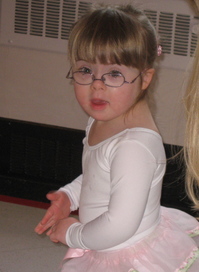I hear the positive stereotypes all the time. From
relatives, friends, doctors, teachers, strangers who strike up a conversation
in a store. “Down syndrome children are so sweet.” Or, “They are all so cute
and happy all the time.” Or, “Down’s kids are angels.”
It’s nice that Penny happens to have a disability that comes
with positive associations. But the comments still bug me. Whenever I hear
generalized statements about Down syndrome, I suspect that Penny has been
overlooked as an individual and has been lumped together with a nameless,
faceless group. And even though they are positive statements, they are still
divisive ones, still statements that place Penny and other individuals with
Down syndrome in a separate category of the population. Finally, I’m not
convinced that it’s true.
I am inclined to agree that having an extra 21st
chromosome brings with it a desire to cuddle. I’m not sure if that desire for
closeness comes from biological or sociological causes, but it’s certainly nice
to have a daughter who climbs in my bed in the middle of the night and says, “I
just need a hug.”
And there’s the Biblical definition of angel, which means, “messenger from God.” I could argue that Penny has been God’s most effective messenger in my life yet.
But the popular use of the term angel is more akin to the other statements I listed above: happy all the time, soft and cuddly, sweet and nice. Think Rafael’s cherubs. By that definition, I can attest that Penny is no angel. She cries. Daily. She grabs things from William. She whines and complains and generally acts like a four-year old.
It might seem odd to try to correct a positive stereotype. I mean, come on, it’s hard enough to confront the negative portrayals. But I think it’s important.
When Penny was younger, a friend said to me, “Isn’t it nice that Penny won’t ever know that people see her as different?” She must have seen the confusion on my face, because then she said, “I mean, Downs kids are just so happy all the time. Penny won’t care when people see her as different.” I happened to have read a study earlier that week about the incidence of depression in young adults and adults with disabilities, including Down syndrome. Another more recent report said that people with disabilities long for friends more than almost anything else. Penny will know that people think she’s different. She’ll be upset if other kids make fun of her. She will feel sad if she’s excluded.
In response to my friend, I said, “From what I understand, people with Down syndrome can feel sadness just like the rest of us.”
So is my daughter an angel? No. She’s a lovely little girl who often wants to help others in need and shows lots of affection and gets nervous around scarecrows and witches and feels sad when her dad isn’t home to say goodnight. She’s just another kid, working out what it means to be human.


